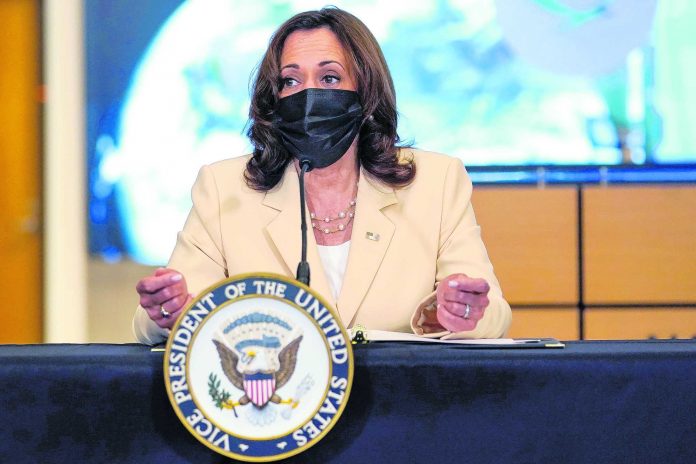
By MATTHEW DALY
Associated Press
WASHINGTON (AP) — Vice President Kamala Harris called climate change an “immediate” and “urgent” crisis Monday as she detailed Biden administration efforts to respond to disasters such as deadly flooding in Kentucky and wildfires ravaging her home state of California.
Harris was set to announce more than $1 billion in grants available to states to address flooding and extreme heat exacerbated by climate change. The competitive grants will help communities across the nation prepare for and respond to climate-related disasters.
Visiting the National Hurricane Center before the grant announcement, Harris said Monday that disasters such as the Kentucky flood and California wildfires show “how immediate, how current and how urgent the issue is of addressing the extreme weather that we’ve been experiencing around the country and the world.”
In 2021, the United States experienced 20 climate-related disasters that each caused over $1 billion in damage, Harris said, citing a report by the National Oceanic and Atmospheric Administration. There were about six such disasters per year in the 1990s.”The frequency has accelerated in a relatively short period of time,” Harris said. “The science is clear. Extreme weather will only get worse, and the climate crisis will only accelerate.”
The White House is leading a government-wide response to climate disasters that “recognizes the urgency of this moment and our ability to do something about it,” she said.
The vice president was at the hurricane center for a briefing before visiting Florida International University, where she is expected to announce grants to defend against extreme weather events across the country.
President Joe Biden announced last month that the administration will spend $2.3 billion to help communities cope with soaring temperatures through programs administered by FEMA, the Department of Health and Human Services and other agencies. The move doubles spending on the Building Resilient Infrastructure and Communities, or BRIC, program, which supports states, local communities, tribes and territories on projects to reduce climate-related hazards and prepare for natural disasters such as floods and wildfires.
“Communities across our nation are experiencing first-hand the devastating impacts of the climate change and the related extreme weather events that follow — more energized hurricanes with deadlier storm surges, increased flooding and a wildfire season that’s become a year-long threat,” FEMA head Deanne Criswell said.
The funding announced Monday will “help to ensure that our most vulnerable communities are not left behind, with hundreds of millions of dollars ultimately going directly to the communities that need it most,” Criswell said.
A total of $1 billion will be made available through the BRIC program, with another $160 million to be offered for flood mitigation assistance, officials said.
Jacksonville, Florida, was among cities that received money under the BRIC program last year. The city was awarded $23 million for flood mitigation and stormwater infrastructure. Jacksonville, the largest city in Florida, sits in a humid, subtropical region along the St. Johns River and Atlantic Ocean, making it vulnerable to flooding when stormwater basins reach capacity. The city experiences frequent flooding and is at risk for increased major storms.
The South Florida Water Management District in Miami-Dade County received $50 million for flood mitigation and pump station repairs. Real estate development along the city’s fast-growing waterfront has created a high-risk flood zone for communities in the city and put pressure on existing systems, making repairs to existing structures an urgent need, officials said.
The Biden administration has launched a series of actions intended to reduce heat-related illness and protect public health, including a proposed workplace heat standard.



















